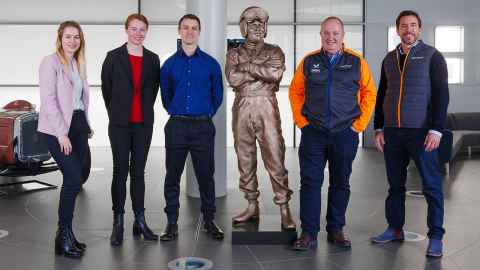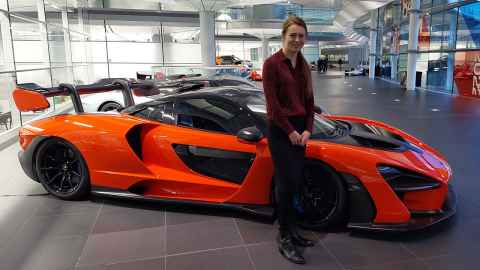Students fuelled by McLaren internships
22 April 2024
An internship programme with McLaren Racing in the UK is exposing engineering students to leading-edge thinking and technology in the automotive industry.

When it comes to living the dream, fourth-year engineering student Alex Barbarich-Bacher says he wasn’t far off the mark during the first week of his three-month internship as an employee of McLaren Racing at their spectacular UK headquarters on the outskirts of London.
“The whole McLaren facility was jaw-dropping as you would expect when they send you up an elevator into a boulevard full of old Formula 1 cars that look out over a lake.”
Motorsport has always been a passion which started with his early involvement in go-karts, so to be invited into McLaren’s ‘mission control’ and be plugged into 20 different radio channels to monitor the final Formula 1 event of the 2023 season was something else.
“It was an amazing introduction to what hopefully continues to be a hell of an experience to say the least.”
In the final stages of a five-year conjoint engineering and commerce degree, Alex says his life has been something of a “jigsaw puzzle”, but the McLaren internship has definitely fuelled his desire to work in the automotive industry.
“I knew I wanted to work in motorsport. But now that I’ve been exposed to Formula 1, I think it’s going to be pretty hard to stay away from it,” he says.
While his initial task has involved data analysis of race cars and going through inventory for parts and suspension set-ups, Alex is looking forward to a two-week stint in Europe testing Formula 1 cars.
“I would hope that even in my three months here, especially with how much rein I’ve already been given, that my input could positively affect the team and the performance of that car.”
Like many of the nine McLaren interns since 2016, Alex has come through the University’s Formula SAE Team which builds a race vehicle from scratch each year. FSAE faculty adviser Dr Tom Allen says the internships are an opportunity for students to break into a “tight” European ecosystem.

“In parallel with giving students a fantastic opportunity to test themselves in a high-performance workplace, we’re also demonstrating to the world that the University of Auckland is able to produce graduates who are parallel to all those universities in Europe who produce, quote unquote, ‘automotive engineers’."
Having been previously funded by a range of donors, the McLaren Automotive and Racing internship programme has been pledged ten years of support by the NZUK Link Foundation which is financially supported by the UK Friends of the University of Auckland, and the late Sir Colin Giltrap. Current donors include Howden Ganley, Keith & Luke Holland, Rob Whitehouse, Eric Tracey and Neil Paton and, from 2024, New Zealand’s Bruce McLaren Trust will also contribute.
Given New Zealand’s geographic isolation and the absence of an automotive industry, Tom says the internships help expose students to leading-edge thinking and technology in areas like composites and control systems which will ultimately benefit the local economy.
“Everyone in McLaren or McLaren F1 is there because they are very skilled at what they do, and so our interns get to learn from the best in the industry and then bring that knowledge back.”
During the three-month programme, interns work in teams across the entire McLaren business to understand the breadth of the industry and make a large number of valuable connections. “It’s not sitting in a dark room where you make tea and coffee for somebody and you find kinks in a spreadsheet,” says Tom.
Over the past few years, interns from the programme have gone on to take roles at McLaren Automotive as well as New Zealand businesses like Rocket Lab and the agritech company Halter. It’s also inspired the 2021 awardee, Sabrina Yarndley, to devote her PhD to studying crash structures in vehicles.
“It definitely helped me figure out what I wanted to do,” says Sabrina, whose interest in composites as chief engineer of the FSAE Team went to another level after visiting the McLaren Composites Technology Centre. “That was just so cool because I could compare their design and production processes to the Formula SAE vehicle we built.”
The insights gained at McLaren have helped Sabrina to identify – and better understand – various pinch points in the design of automotive crash structures which she is now investigating with the aim of developing more robust, environmentally friendly and cost-effective protection.
“If I can make a shorter crash structure, that could give design teams a bit more freedom,” she says, “although composite crash structures are typically only used in very high-end vehicles. My research looks to take the next step towards bringing that technology to regular consumers.”
Meanwhile the challenge for Tom is to replicate the McLaren internship in other sectors like New Zealand’s emerging space industry. “The ability to partner with European or American aerospace industries would be amazing if we could have the same opportunity, maybe an Airbus internship?”
Media contact
Helen Borne | Communications and Marketing Manager
Alumni Relations and Development
Email: h.borne@auckland.ac.nz